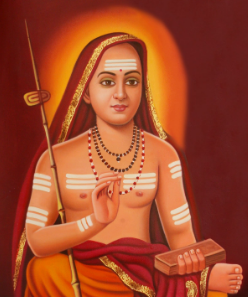The Sringeri Sharada Peeth, one of the most significant Hindu religious sites in India, is led by Shankaracharya. The Peetha’s rigorous Vedanta program is directed by Shankaracharya, who is also its spiritual and intellectual leader.
Jagad Guru Shri. Adi Shankaracharya: Who Was He?
Indian philosopher Jagad Guru Shri. Adi Shankaracharya (also known as Adi Shankara) lived from roughly 788 to 820 CE. He is regarded as one of the leading thinkers in Indian philosophy history. His Advaita Vedanta philosophy, which holds that all appearances are based on a single reality, is what is most widely recognized about him.
Early Years of Shri. Adi Shankaracharya
Shankaracharya was born in a small village in the state of Kerala in southern India in 788 AD. He displayed a keen interest in spirituality and the nature of the universe at a very young age. At the age of 16, he gave up on the world and embarked on a spiritual journey that would take him throughout India.
Shankaracharya acquired knowledge of India’s various spiritual traditions while traveling and eventually came to regard them as all being a part of a single, unified tradition. In addition, he started to formulate his philosophy, which aimed to incorporate all of India’s various religious traditions under a single heading.
In the end, Shankaracharya was able to bring together all of India’s various religious groups into one functional whole. The various Hindu schools of thought are also said to have been brought together by Shankara, who is also credited with helping Hinduism recover after the Islamic conquests.
Religious Beliefs of Shankaracharya
In the eighth century AD, Shankaracharya was born into a Hindu Brahmin family. He attained enlightenment at a young age and quickly rose to prominence as a respected figure in religion and spirituality. He was an ardent supporter of Hinduism. Advaita Vedanta, which holds that there is only one reality and that all difference is an illusion, is the central idea of Shankaracharya’s teachings.
What Did He Mainly Achieve For Hinduism?
One of Hinduism’s most important philosophers, Shankaracharya, is regarded as such. Religion, as it is practiced today, was defined and organized by him. A branch of Hinduism that emphasizes non-duality and the unity of all reality, Advaita Vedanta, was also influenced by him. Because of his significance in Hindu history, Hindus still hold Shankaracharya in high regard today.
What Were His Main Principles?
Shankaracharya is credited with developing much of Hinduism’s current philosophical outlook and is regarded as one of the religion’s most important historical figures.
Adi Shankaracharya’s core belief was that knowledge is the only thing that can deliver people from suffering. He held that ignorance was the source of all pain and that knowledge was the only path to true happiness for people.
How Has He Affected Contemporary Hinduism?
Shankaracharya’s teachings are still appropriate today, and he is regarded as one of Hinduism’s most important early thinkers.
One of the main schools of Hindu thought, Vedanta philosophy, was greatly systematized by Adi Shankaracharya. After centuries of decline, he also contributed to the revival of Hinduism. Modern Hindus still study and discuss his teachings, and his influence can be seen in the many different ways that Hinduism is practiced today.
In addition, he promoted the Advaita (non-dualist) school of thought, which maintains that Brahman (the eternal reality) is the only thing that is actually real.
Conclusion
India has unified under one religion thanks to Shankaracharya, and his teachings are still widely followed today. His contributions as a teacher and philosopher are unparalleled, and his legacy will live on for a very long time.
